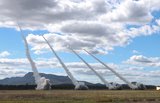Australia looks towards space with force restructure, investment and training
Australia is looking to improve its presence in space with a focus on communications and creating a dedicated segment of its defence forces committed to the domain.
Raytheon UK has been awarded a £131 million contract extension from the British Royal Air Force (RAF) to continue to manage support services for the Sentinel surveillance aircraft programme, it announced on 28 October. This extends the contract to 2021.
Under the extension, Raytheon will continue to manage the design, configuration management, modification and support aspects of the RAF's Sentinel airborne battlefield and ground surveillance aircraft at its facility in Broughton, Wales, and RAF Waddington.
The company has, with the support of the Welsh government, invested in a new hangar at its Broughton facility to ensure that it can continue to deliver design-to-flight-trials capability for improved operational availability.
With this investment, the company will be able to manage export work and optimise Sentinel support, reducing the time and costs involved in 8C deep maintenance checks.
The full range of Raytheon's technical support for the Sentinel fleet includes fleet management, maintenance planning, maintenance service, technical and engineering services, obsolescence management, air vehicle integrity, supply and procurement service, training, design service and overarching service management.

Australia is looking to improve its presence in space with a focus on communications and creating a dedicated segment of its defence forces committed to the domain.

The Portuguese company’s naval communications system is in service across more than a dozen countries. It has turned to its home nation for support in developing a new vehicle based C2 system.

The Vision4ce Deep Embedded Feature Tracking (DEFT) technology software is designed to process video and images by blending traditional computer vision with artificial intelligence (AI) algorithms to present actionable information from complex environments.

Persistent Systems has been cleared by National Security Agency (NSA) to transmit sensitive data on commercial networks. The devices are added to the NSA’s Commercial Solutions for Classified (CSfC) component list which also includes other companies’ products providing the same security.

The release of the UK’s Strategic Defence Review (SDR) has been long promised as mid-year. It is possible it could be as early as 2 June although the UK Ministry of Defence (MoD) continues to play its cards close to its chest.

Intelsat outlines how its multi-orbit SATCOM architecture is enhancing connectivity and resilience for special operations forces operating in degraded and contested environments.